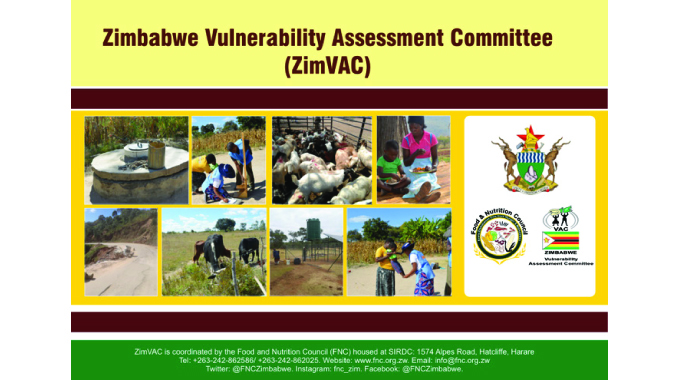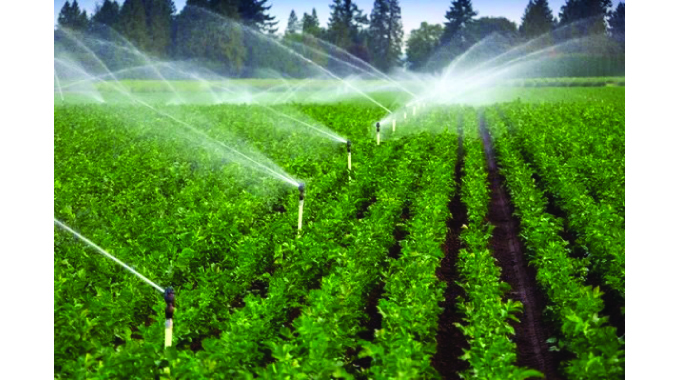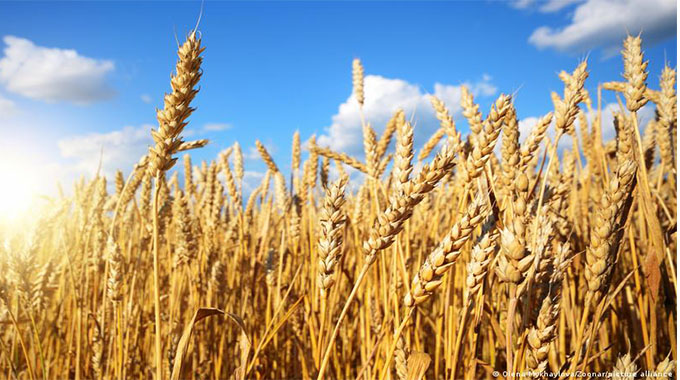
The Sunday News

Vincent Gono, Features Editor
ACHIEVING sustainable smallholder irrigation development that speaks to climate smart agriculture and market access has been identified as the key to unlocking land value and food self-sufficiency at household and community level that has been so elusive in Chivi district, Masvingo province.
The district is known for being arid and has been one of the country’s perennial basket community cases with the recent Zimbabwe Vulnerability Assessment Committee (ZimVAC) reporting that food insecurity rose by ten percent from 38 to 48 percent.

Zimbabwe Vulnerability Assessment Committee (ZimVAC)
District Development Coordinator for Chivi, Mr Innocent Matingwina told Sunday News during a recent visit that vulnerability in the district has been exacerbated by flash flooding that affected cropping.
The district also suffered loses of cattle that succumbed to a deadly tick-borne disease popularly known as January disease.
He said cattle formed the basis of wealth for most families and their death en mass further impoverished the villagers.
“Very few people harvested food to take them beyond five months.
And what it means is that the communities already need assistance. We have started mobilising for food distribution in 22 out the 32 Wards in the entire district,” he said.
He says that they are being assisted by partners such as Jairos Jiri that is covering seven wards in Chivi South, while three wards are getting assistance from Nutrition Action Zimbabwe where there are more than 5000 beneficiaries.
Some of the wards are getting food assistance from Care International’s Takunda which is targeting a certain demographic group – the under five years old.
But its not all gloomy.
There is a silver lining in all the issues around food security in Chivi district and the results are beginning to show with six irrigation schemes having been revived so far according to Mr Matingwina.

Tugwi-Mukosi dam
He said the implementation of the Tugwi-Mukosi Dam masterplan was expected to move Chivi district from the basket case that it was currently to a district that the country could rely on in terms of food provision as more land was going to be opened for irrigation.
Irrigation development, he notes, has been one of the major targets of the Second Republic as it strives to ensure rural households achieve food and nutrition security and are resilient to climate change effects and economic shocks in all the drought prone districts.
With the revival of small holder irrigation schemes in Chivi such as Banga, Makonese, Nyamakwe, Gondo and two others, there has been an increase in production of selected crops, an increase in annual household income, an increased market integration and a production system that is better adapted to climate change.
The DDC says the district has been using part of devolution funds to work on irrigation schemes and infrastructure related to water and sanitation as part of its efforts to alleviate poverty within the communities.

Banga Irrigation Scheme
He said the district now takes pride in Banga Irrigation Scheme that was brought to life through the Smallholder Irrigation Revitalisation Programme (SIRP) that was approved by the International Fund for Agriculture Development (IFAD).
“We have developed and revived a number of irrigation schemes in the district. We thank the government for ensuring food security through SIRP. Irrigation schemes such as Banga that have been lying dormant have been livened and communities are benefiting,” he said.
This, he says, is going to lessen the government burden of feeding the entire district as irrigation schemes will be producing food not only for the farmers but to the communities around.
Chivi Rural District Council’s Agriculture and Natural Resources Officer, Ms Natsai Chimhiti said although Banga Irrigation Scheme in ward 26 was established in 1972, it had not been functioning well as its use was characterised by on and offs as well as periods of dysfunction.
She said surrounding communities in wards 25, 26, 27 and 28 were part of the areas that were directly benefiting from the irrigation scheme that was officially commissioned by the Minister of Lands, Agriculture, Fisheries, Water and Rural Development Dr Anxious Masuka in April this year.
“About 800 households including 293 plot holders are directly benefiting.
We have seen an encouraging production of high yielding crop varieties being grown in blocks throughout the year mainly maize, beans, groundnuts and wheat.
Furthermore, rehabilitation of the scheme has ensured constant availability of water in the Banga Dam thus enabling production of crops throughout the year.

wheat
For now, we have wheat and maize crop and its promising,” she said.
Ms Chimhiti said the challenges that they sometimes face was that of water shortage due to heavy siltation.
“The dam is heavily silted and the catchment area need to be rehabilitated and conservation works up slope carried out if farmers are to constantly use the dam without hiccups.
In the long term, there is a possibility of harnessing water from Tugwi-Mukosi Dam by gravity to supply water to Banga irrigation scheme and that will ensure continuity,” she added.
She noted the need for spatial expansion of the area under cultivation so as to have more hectarage and to accommodate more farmers into the scheme.
“There is also need to establish a big water reservoir to guarantee constant supply of water and ensure that no crop is disturbed from planting up to harvesting.
We also have the challenge of poor markets, poor road (from tarred road to the scheme) and unavailability of capital to purchase the requisite inputs,” said Ms Chimhiti.
A beneficiary, Mr Runesu Machona said as farmers, they were reaping great benefits from Banga Irrigation Scheme since its revitalisation.
“We are growing our crops here. We have wheat, maize and sometimes beans.
The irrigation scheme has made life easier for us and the communities around us.
We no longer need to travel far and wide to look for food as we can now provide for our families and a surplus for sale to surrounding villages,” he said.
He added that they were also deriving benefits from an improved household nutrition as they were growing a variety of high nutrient crops such as beans.
He thanked the efforts by the government in ensuring the irrigation scheme was functioning.
Mr Machona said the farmers revel in the hope and promise of harnessing more water from Tugwi-Mukosi for more agricultural activity in the community saying it was gratifying when locals are given the latitude to benefit from resources in their area in line with the devolution spirit.



